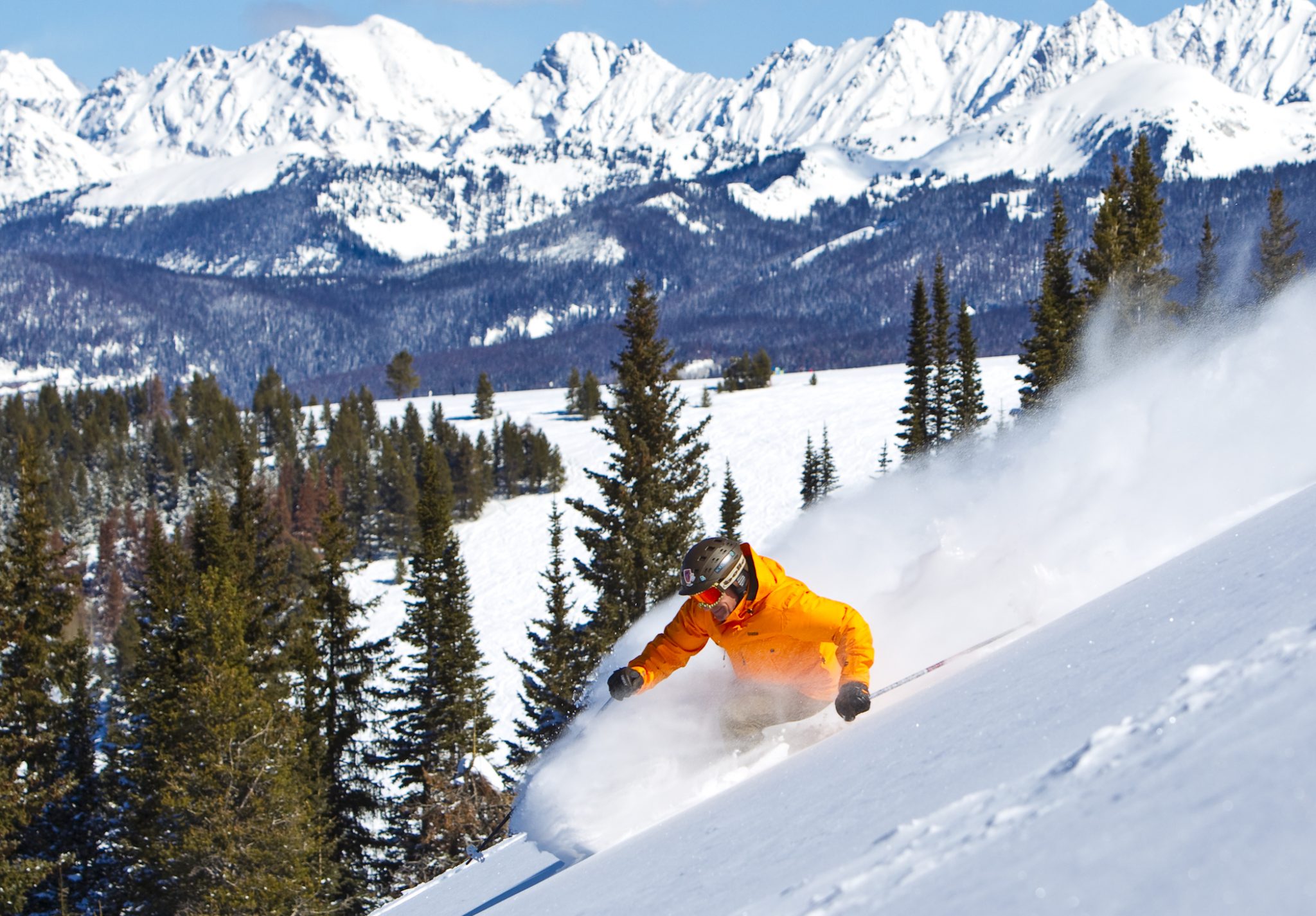Vail Resorts, reports results for the second quarter of fiscal 2017 ended January 31, 2017 and provided the Company’s ski season-to-date metrics through March 5, 2017.
The net income attributable to Vail Resorts, Inc. was $149.2 million for the second fiscal quarter of 2017, an increase of 27.5% compared to net income of $117.0 million for the second fiscal quarter of 2016.
Resort Reported EBITDA was $305.2 million for the second fiscal quarter of 2017, which includes the operations of Whistler Blackcomb and $2.1 million of transaction, transition and integration costs associated with the Whistler Blackcomb acquisition. Excluding Whistler Blackcomb operations and transaction, transition and integration costs, Resort Reported EBITDA increased 6.5% compared to the same period in the prior year.
The Company updated its fiscal 2017 guidance range and is now expecting Resort Reported EBITDA to be between $577 million and $597 million, including estimated operating results from Whistler Blackcomb as well as an estimated $9 million of related transaction, transition and integration costs.
The Company’s Board of Directors approved a 30% increase in the quarterly cash dividend to $1.053 per share from $0.81 per share beginning with the dividend payable on April 13, 2017 to stockholders of record as of March 29, 2017.
On February 21, 2017, the Company announced that it entered into an agreement to acquire the mountain operations of Stowe Mountain Resort in Stowe, Vermont. The Company expects the acquisition to close in late spring.
On February 24, 2017, the Company announced the 60-year renewal of Whistler Blackcomb’s Master Development Agreements with the Province of British Columbia.
Commenting on the Company’s fiscal 2017 second quarter results, Rob Katz, Chief Executive Officer said,
“We are very pleased with our results for the quarter. We had strong results during the holidays and the month of January despite a slower start to the season at our U.S. resorts resulting from below average early season conditions. Including results from Whistler Blackcomb in the second quarter of fiscal 2017, total lift revenue increased 24.5%, driven by a 15.7% growth in visitation and a 7.7% increase in effective ticket price (“ETP”) in the second quarter compared to the prior year. We continue to see robust destination guest spending trends which, along with the addition of Whistler Blackcomb, drove a 25.9% increase in ski school revenue and a 21.5% increase in food and beverage revenue compared to the prior year.”
“Results from Whistler Blackcomb in the second quarter of fiscal 2017 were stronger than our initial expectations and helped to offset the slower start at our U.S. resorts. The resort has benefited from good conditions throughout the season, a low Canadian dollar versus the U.S. dollar and the outstanding brand and guest experience delivered by the Whistler Blackcomb team.
Excluding Whistler Blackcomb operations, total lift revenue increased 7.3% and yields improved in each of our ancillary businesses. Park City continues to deliver the strongest growth among our U.S. resorts with increasing visitation and yields in our second season following the transformational investments to combine Park City and Canyons.
Our Colorado resorts delivered results that were in line with their record prior year performance despite the slower start to the season, benefiting from robust guest spending and growth in season pass sales. The Tahoe resorts benefited from significant snow storms that, while creating outstanding conditions for the rest of the season, led to road and resort closures during the month of January, primarily during off-peak periods.
While U.S. destination visitation was robust, international visitation to our U.S. resorts was down in the second quarter compared to the prior year impacted by the strong U.S. dollar and a notable decline in Mexican visitation. Whistler Blackcomb continues to see strong international visitation. Our results in the second quarter demonstrate the benefit of our growing geographic diversification and the success of our season pass and destination guest focused marketing strategies.”
Regarding the Company’s Lodging segment, Katz said, “Our lodging results were positive for the second fiscal quarter but were adversely impacted by the same poor early season conditions as our mountain results. Revenue (excluding payroll cost reimbursements) increased 4.0% compared to the prior year primarily driven by the addition of Whistler Blackcomb.”
Katz continued, “Resort Reported EBITDA was $305.2 million for the fiscal quarter, an increase of 26.1% compared to the same period in the prior year. Our Resort EBITDA Margin for the fiscal quarter improved 180 basis points over the prior year as we continue to drive strong flow through from our revenue growth and leverage our scale. Given our performance to date and assuming normal conditions through the remainder of the season, we expect Resort Reported EBITDA for fiscal 2017 to be between $577 million and $597 million.”
Regarding the Company’s Real Estate segment, Katz said, “During the fiscal quarter, we closed on one condominium unit at The Ritz-Carlton Residences, Vail and the last two condominium units remaining at One Ski Hill Place in Breckenridge, which is now completely sold-out. Net Real Estate Cash Flow for the second quarter of fiscal 2017 was $3.9 million. Since January 31, 2017, we have closed on two additional units at Ritz-Carlton Residences, Vail, with only one unit remaining to be sold.”
Regarding capital allocation, Katz said, “We remain confident in the strong cash flow generation and stability of our business model, and we are committed to returning capital to our shareholders. We are pleased to announce that the Board of Directors has approved a 30% increase to our quarterly dividend and declared a quarterly cash dividend on Vail Resorts’ common stock of $1.053 per share, payable on April 13, 2017 to stockholders of record on March 29, 2017.”
Katz added, “Our balance sheet remains very strong. We ended the fiscal quarter with $140.9 million of cash on hand and our Net Debt, including the capitalized Canyons obligation, was 2.2 times trailing twelve months Total Reported EBITDA, though it is important to note that while this ratio includes our outstanding debt as of January 31, 2017, it only includes Whistler Blackcomb’s EBITDA results from the date of acquisition.”
Capital improvement plan
The Company expects to invest approximately $103 million in its calendar year 2017 capital plan, excluding anticipated investments at Whistler Blackcomb, capital expenditures for U.S. summer related activities and one-time integration capital expenditures at Whistler Blackcomb. The plan includes approximately $65 million of maintenance capital expenditures and a number of high-impact, high ROI discretionary investments.
Commenting on the capital plan, Katz said, “At Vail Mountain, we will continue to improve lift capacity at one of the resort’s busiest chairlifts by upgrading the Northwoods high speed four person chair (#11) to a new high speed six person chairlift. At Breckenridge, we will be upgrading the Peak 10 Falcon Chair from a four person high speed chair to a six person high speed chair, allowing more guests to experience some of the best intermediate and advanced terrain on the mountain. At Keystone, we will be investing significant capital to continue to enhance the experience at this outstanding family focused resort.
We will be upgrading the four person Montezuma chair to a six person high speed chair to improve circulation on the front side of the mountain, and we will be renovating and expanding Labonte’s restaurant by 150 indoor seats to increase mountain dining capacity at the fourth most visited resort in the U.S.
At Beaver Creek, we will be upgrading the fixed grip two person Drink of Water chair (#5) to a four person high speed chair, increasing the capacity for important beginner and intermediate terrain and, upon completion, all primary chairlifts on Beaver Creek will be high speed.
Our capital plan also includes the second phase of a two-year process to revamp our primary websites to a single ‘responsive’ desktop/mobile platform which will be integrated with our data-based and personalized marketing technology and the first phase of a three year plan to completely revamp and modernize RPOS, the primary software platform for all of our resort operations.”
The Company also plans to invest approximately $6 million in calendar year 2017 for Epic Discovery summer activities. This capital will be focused on activity construction at Breckenridge in conjunction with the official launch of Epic Discovery at the resort this summer with more modest spending at Vail and Heavenly.
At Whistler Blackcomb, the Company plans to invest approximately C$23 million (US$17 million) in calendar year 2017 for maintenance and discretionary projects. The plan includes key summer investments for the resort with the expansion of the bike park into the Creekside area, the construction of a signature suspension bridge at the top of Whistler Mountain and other summer amenities that support the already robust summer visitation at the resort.
These investments are the first capital projects associated with the Renaissance plan following the renewal of the Master Development Agreements. The Company anticipates that additional spending related to the Renaissance plan will commence in calendar year 2018 and additional details will be provided as the timing of the projects is refined.
Additionally, the Company plans to invest approximately $17 million in capital during calendar year 2017 for the Whistler Blackcomb integration. These investments will allow us to fully integrate Whistler Blackcomb’s systems, marketing and operations, including hardware at the resort, to achieve our anticipated synergies and create the streamlined, centralized approach that is consistent across our network for guests and employees.
Stowe Mountain Resort Acquisition
As previously announced on February 21, 2017, the Company entered into an agreement to acquire the mountain operations of Stowe Mountain Resort in Stowe, Vermont from Mt. Mansfield Company, Inc., a wholly owned subsidiary of American International Group, Inc., for a cash purchase price of $50 million, subject to certain adjustments.
At closing, the purchase price will be adjusted for certain agreed upon terms, including a reduction (or increase) in the purchase price by the amount that the resort’s EBITDA exceeds capital expenditures for the period from November 1, 2016 through closing of the acquisition. Stowe Mountain Resort is expected to generate incremental annual EBITDA in excess of $5 million in Vail Resorts’ fiscal year ending July 31, 2018.
The transaction is subject to Vermont administrative review. The Company expects the acquisition to close in late spring.
Whistler Blackcomb Master Development Agreements
As previously announced on February 24, 2017, Whistler Blackcomb’s Master Development Agreements with the Province of British Columbia have been renewed for a 60-year term and the associated Master Plans have also been approved by the Province.
Operating Results
A complete Management’s Discussion and Analysis of Financial Condition and Results of Operations can be found in the Company’s Form 10-Q for the second fiscal quarter ended January 31, 2017 filed today with the Securities and Exchange Commission. The following are segment highlights:
Mountain Segment
Total lift revenue increased $70.6 million, or 24.5%, compared to the same period in the prior year, to $358.2 million for the three months ended January 31, 2017, primarily due to incremental revenue from Whistler Blackcomb. Excluding Whistler Blackcomb, total lift revenue increased 7.3% compared to the same period in the prior year.
Ski school revenue increased $16.1 million, or 25.9%, for the three months ended January 31, 2017 compared to the same period in the prior year, primarily as a result of incremental Whistler Blackcomb revenue. Excluding Whistler Blackcomb, ski school revenue increased 1.3%.
Dining revenue increased $9.6 million, or 21.5%, for the three months ended January 31, 2017, compared to the three months ended January 31, 2016, due to incremental revenue from Whistler Blackcomb. Excluding Whistler Blackcomb, dining revenue decreased 2.5% as a result of delays in the opening of certain on-mountain dining venues at our U.S. resorts which were impacted by poor early ski season conditions.
Retail/rental revenue increased $20.3 million, or 19.7%, for the three months ended January 31, 2017 compared to the same period in the prior year, due primarily to incremental retail sales and rental revenue from Whistler Blackcomb.
Excluding Whistler Blackcomb, retail/rental revenue decreased 2.0%. The decrease in retail/rental revenue was primarily attributable to lower sales volumes at stores proximate to our Tahoe resorts and in the San Francisco Bay Area as a result of inclement weather and poor early season conditions in the region.
Operating expense increased $59.0 million, or 19.9%, for the three months ended January 31, 2017 compared to the three months ended January 31, 2016, primarily due to operating expenses from Whistler Blackcomb and $2.1 million of transaction, transition and integration expenses associated with the Whistler Blackcomb acquisition.
Mountain Reported EBITDA increased $62.5 million, or 26.4%, for the fiscal quarter compared to the same period in the prior year. Excluding EBITDA from Whistler Blackcomb operations and transaction, transition and integration expenses of $2.1 million, Mountain Reported EBITDA increased 6.6%.
Mountain Reported EBITDA includes $3.7 million of stock-based compensation expense for the three months ended January 31, 2017 compared to $3.3 million in the same period in the prior year.
Lodging Segment
Lodging segment net revenue (excluding payroll cost reimbursements) for the three months ended January 31, 2017 increased $2.4 million, or 4.0%, as compared to the same period in the prior year, primarily due to incremental revenue from Whistler Blackcomb.
For the three months ended January 31, 2017, occupancy decreased 2.3 percentage points and ADR increased 11.8% at the Company’s owned hotels and managed condominiums compared to the same period in the prior year.
Lodging Reported EBITDA for the three months ended January 31, 2017 increased $0.7 million, or 12.8%, compared to the same period in the prior year. Excluding EBITDA from Whistler Blackcomb operations,
Lodging Reported EBITDA was relatively flat compared to the same period in the prior year with favorability in the Lodging business being offset by the impact of selling the Inn at Keystone on November 17, 2016.
Lodging Reported EBITDA includes $0.8 million of stock-based compensation expense for both the three months ended January 31, 2017 and 2016.
Resort – Combination of Mountain and Lodging Segments
Resort net revenue increased $124.3 million, or 20.9%, to $720.0 million for the three months ended January 31, 2017 compared to the same period in the prior year, primarily attributable to revenue from Whistler Blackcomb.
Resort Reported EBITDA was $305.2 million for the three months ended January 31, 2017, an increase of $63.2 million, or 26.1%, compared to the same period in the prior year. Excluding EBITDA from Whistler Blackcomb and transaction, transition and integration expenses of $2.1 million, Resort Reported EBITDA increased 6.5%.
Real Estate Segment
Real Estate segment net revenue for the three months ended January 31, 2017 increased $1.5 million, or 41.6%, as compared to the same period in the prior year.
Net Real Estate Cash Flow was $3.9 million for the three months ended January 31, 2017, an increase of $1.7 million from the same period in the prior year.
Real Estate Reported EBITDA decreased by $0.3 million, to a loss of $0.6 million for the three months ended January 31, 2017 compared to the same period in the prior year.
Total Performance
Total net revenue increased $125.8 million, or 21.0%, to $725.2 million for the three months ended January 31, 2017 as compared to the same period in the prior year.
Net income attributable to Vail Resorts, Inc. was $149.2 million, or $3.63 per diluted share, for the second quarter of fiscal 2017 compared to net income attributable to Vail Resorts, Inc. of $117.0 million, or $3.14 per diluted share, in the second fiscal quarter of the prior year.
Season-to-Date Metrics through March 5, 2017
The Company announced ski season-to-date metrics for the comparative periods from the beginning of the ski season through Sunday, March 5, 2017, and for the prior year period through Sunday, March 6, 2016. The reported ski season metrics are for our North American resorts, adjusted as if Whistler Blackcomb was owned in both periods using comparable exchange rates in each applicable period. The metrics exclude results from Perisher and our urban ski areas in both periods. The following data is interim period data and subject to fiscal quarter end review and adjustments.
Season-to-date total lift revenue at the Company’s North American mountain resorts, including an allocated portion of season pass revenue for each applicable period, was up 6.7% compared to the prior year season-to-date period.
Season-to-date ancillary spending increased over the prior year, with ski school revenue up 5.2% and dining revenue up 1.8% at the Company’s North American mountain resorts. Additionally, retail/rental revenue for resort store locations was up 3.2% compared to the prior year season-to-date period.
Season-to-date total skier visits for the Company’s North American mountain resorts were down 4.0% compared to the prior year season to-date period.
Return of Capital
The Company declared a quarterly cash dividend of $1.053 per share of Vail Resorts common stock that will be payable on April 13, 2017 to stockholders of record on March 29, 2017. Additionally, a Canadian dollar equivalent dividend on the exchangeable shares of Whistler Blackcomb Holdings Inc. will be payable on April 13, 2017 to shareholders of record on March 29, 2017. The exchangeable shares were issued to certain Canadian persons in connection with our acquisition of Whistler Blackcomb Holdings Inc.
Outlook
Resort Reported EBITDA is expected to be between $577 million and $597 million for fiscal 2017, including estimated operating results from Whistler Blackcomb as well as an estimated $9 million of related transaction, transition and integration costs.
The updated outlook for fiscal year 2017 does not include any estimates for the operating results of Stowe Mountain Resort or any related transition or integration expenses. The transaction remains subject to closing, which is anticipated to occur in late spring.
Resort EBITDA Margin (defined as Resort Reported EBITDA divided by Resort net revenue) is expected to be approximately 31.2% in fiscal 2017, at the midpoint of our guidance range.
Fiscal 2017 Real Estate Reported EBITDA is expected to be between $2 million and $6 million.
Net income attributable to Vail Resorts, Inc. is expected to be between $196 million and $222 million in fiscal 2017.
Read the full report here.

































Vail have been price gouging customers on all fronts at Whistler since the the takeover last year. From lockers to food there have been many exorbitant price increases. Couple this with the devaluation of passes through the price invreases and reduction in benefits and it’s no wonder revenues are up.